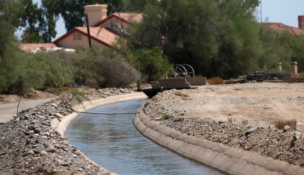A Federal rebuke
Arizona Capitol Reports Staff//January 25, 2008//[read_meter]

State and federal authorities have stripped Evergreen Foothills Health & Rehabilitation Center of its Medicare privileges after finding numerous instances of neglect and improper care during a recent inspection of the facility at 15810 South 42nd Street in Phoenix. It was the first nursing home in Arizona to receive such a punishment in more than eight years, federal officials said.
An Ahwatukee nursing home has lost its ability to receive Medicare funding after a recent state and federal inspection of the facility uncovered a litany of patient-care violations.
The sharp rebuke for Evergreen Foothills Health and Rehabilitation Center is a rare occurrence for nursing homes licensed to receive funding for Medicare residents.
On average, nine or 10 licensed facilities covered by the regional office of the federal government get their Medicare agreements pulled a year — out of about 1,500 that operate in Arizona, Nevada, California and Hawaii, according to the Center for Medicare and Medicaid Service.
The federal government warns about 150 facilities a year, but the homes usually are allowed six months to get their services back into compliance with federal law before agreements are terminated, said Paula Perse, a long-term care manager for CMS.
Perse said she believes an Arizona facility has not gone into full termination by CMS since 1999.
In December, inspectors with the Arizona Department of Health Services found 23 state and 34 federal deficiencies at the Evergreen facility located in Ahwatukee.
The resident facility holds between 70 and 80 patients, and its performance on past appraisals has “yo-yoed,” said Silvia Balistreri, a program manager for Long-Term Care Licensing Office of the Arizona Department of Health Services.
On Dec. 19, a condition of immediate jeopardy to resident health and safety was announced at the home after inspectors learned direct care staff was completely unaware of a non-communicative, brain-damaged patient’s broken ribs.
The facility’s administrators also did not “seem aware” of the fact the bed-ridden resident with osteoporosis had three rib fractures, though the injury was noted in clinical records from a hospital visit less than a week before, describing it as “very painful.”
There also was no evidence to suggest a doctor’s directions for care to minimize pain and risk of further injury were ever given to direct care staff, according to a 122-page statement of deficiencies and a plan of correction filed with the state.
Not only was care staff ignorant of the man’s injuries, but administrators responsible for investigating injuries and potential abusive incidents were also unable to determine what constitutes injuries of unknown origin, said Balistreri.
“The potential for more serious injury was there,” she said. “The concern is when we have so many deficiencies it is an indication that there are widespread system deficiencies in the facility. That becomes very concerning.”
The report also found that administrators of Evergreen Foothills routinely failed to notify the state agency of patient’s injuries, as required. Among other incidents reported at the facility:
• Blood-test work for a hypertensive patient with Alzheimer’s never completed as ordered by a physician. Patient also was found to have a broken left forearm that was never investigated, an injury described as “being of unknown origin and suspicious of abuse.”
• Blood of Alzheimer’s patient with severe blood clots contained “critical levels” of Coumadin, an anti-coagulant. Patient’s neck was also burned from “prolonged exposure” to a hair drier in the facility’s salon. Patient had also not been bathed for “several weeks,” displaying “skin-integrity breakdown” and “significant amount of dry flaking white particles throughout all of her scalp area and shoulder length hair.”
• A “large amount of brown material” falls off and floats above a paraplegic patient’s leg when a sock is removed for wound care. Records indicate the patient was “resistant” to showers and may have been bathed only once from Sept. 26 to Nov. 1. Documented plans to encourage resident to shower at least twice a week were never carried out. A resident was described as “disheveled and foul-smelling” in the report and was unable to tell interviewers when she last had showered, but informed them, “I need more showers.” Resident substance abuse, evidenced by pocketing of medications and snorting crushed pills were not addressed by the facility.
• Staff did not perform catheter care for a resident with diabetes, hypertension, urosepsis, urinary-tract infection and anoxic encephalophy. That duty was usually allowed to be performed by patient’s family. It was unknown if the family had been educated on proper catheter care. On one occasion, staff was observed incorrectly cleaning a resident’s catheter. An Evergreen Foothills administrator later told the survey team soap and water was used to clean catheters, so patients do not experience “burning.”
• Staff was not aware of any psychiatric evaluations completed that determine the appropriateness of giving one resident Haldol, a powerful medication used to treat mental illnesses such as schizophrenia. The resident’s clinical report contained signed consent forms for anti-psychotic medications. The forms were signed by somebody other than the patient, and no forms were present documenting power of attorney.
• Survey group found no evidence that facility policy to track occurrences and trends “that may indicate presence of abuse, neglect, misappropriation of resident property or injury of unknown source” were being carried out.
The facility did not respond to phone calls from the Arizona Capitol Times, though representatives from the facility have met with the Arizona Department of Health Services, said Balistreri.
The state has not finalized any enforcement action against Evergreen Foothills, she said.
It was not immediately known if the facility will shut down or whether the residents will continue to stay. It is not uncommon for facilities to temporarily pay for Medicare and Medicaid residents themselves, while they attempt to bring their services back into compliance, said Perse of the Center for Medicare and Medicaid Service.
In August, a survey of Evergreen Foothills found six deficiencies — four in the quality-care category and two described as environmental. On average, Arizona nursing homes produce 10 violations. Nationally, that figure drops to eight, according to the U.S. Department of Health and Human Services.
The findings from the August visit were an improvement from a similar inspection completed in February when 40 violations were recorded.
















